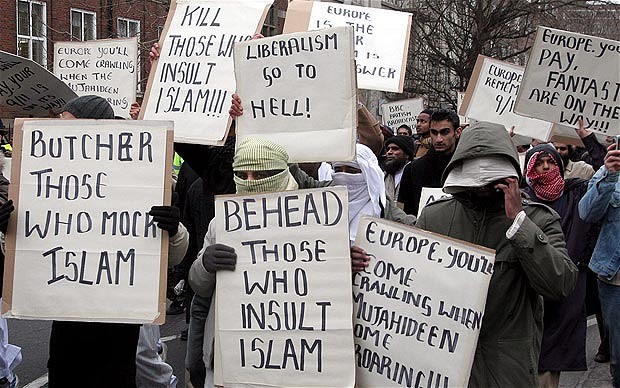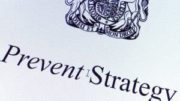Since at least the start of the Age of Enlightenment, and up until the advent of the capricious ‘hate speech’ laws, Britain had an ever expanding free speech culture and had successive governments that as time went by, punished less and less people for the things that they may have said. This free speech culture was one that not only gave Britons the right to speak freely about most things, except for sedition in wartime, even if what they were saying was complete gibberish, but was also one that gave shelter to various political and religious dissidents who came here to benefit from this freedom.
Over time it came to be seen by both governments and people, quite rightly in my view, that freedom of speech was a safety valve for society a means of allowing people to voice their concerns rather than bottling them up which has the danger that when these concerns emerge they will emerge violently and destructively. Unfortunately, as the Indian writer Pritam Banerjee in an article for Swarajya magazine (h/t ROP) points out ‘safety valves need to be properly designed or they will be dangerous’. Pritam states this in his account of how Islamic extremists in 1990’s London used Britain’s then laissez faire speech policy to promote jihad and violence against others and is a chilling account of how leaving Muslim groups alone to promote hatred against Hindus and others did not reduce extremism but encouraged it.
Pritam Banerjeee, after speaking of a comment by an Indian Judge about how dissent was a safety valve in a democratic society went on to describe his life as an Indian ex-pat in Bounds Green in North London in the 1990’s and how a ‘hands off’ approach by the UK government has allowed rabid Islamic extremism to flourish there.
Mr Banerjee said:
Justice Chandrachud’s reference to dissent as a form of safety valve in democracies is undoubtedly well meant and pertinent. But as any engineer would tell you, safety valves need to be well designed. Otherwise they can lead to all kinds of lethal accidents. To allow dissent without discernment is dangerous to the very fabric of civilian engagement and compromise that modern democracies embody.
I am speaking from personal lived experience from late 1990s United Kingdom. Living as a student in London in 1999-2000, I found cheap lodgings with a Bangladeshi immigrant family in Bounds Green area of north London. This stretch of the city from around Finsbury Park northwards had a large immigrant population, South Asian, Turkish, and West African, which was predominantly Muslim. These were pre 9/11 days, and mosques, ‘social clubs’, and shops brazenly displayed poster exhorting the faithful to jihad, and the destruction of the infidel in Kashmir and Chechnya.
Mr Banerjee then went to explain in the article how he investigated the phenomenon of Islamic extremism in North London and how some seriously gross exhortations to murder Hindus and Sikhs were tolerated and encouraged there. After talking to some older Muslim people of Pakistani and Indian extraction, including those who have suffered following the Partition of the Indian Subcontinent at Independence, Mr Banerjee discovered that what had happened was that the mosques and migrant social clubs had been taken over by avowed Islamic extremists. This takeover had Mr Banerjee said happened gradually over a long period and was ignored by the British government and the decent Muslims felt that they were powerless to stop the capture of hitherto non-extreme organisations. This chimes very closely to how the author Melanie Philips has described the situation in London in the 1980’s and 1990’s in her book ‘Londonistan’. In that book Ms Philips described how some quite nasty Islamic extremists were to a large extent ‘left alone’ by both the Government and the security forces partially on the grounds that although these extremists may have been encouraging violence overseas, they were not fomenting violence here in the UK. Sadly, as we have seen from what has happened in the 21st century, these Islamic extremists have not stopped at inciting hatred of those in India, Chechnia and elsewhere but soon turned their hate filled attention to Britons.
Mr Banerjee then went on to explain how he dug down in the migrant communities of North London to try to find out what had happened and how the mosques and meeting places for the normal decent Muslims could have been turned to jihad? What he found was that a small group of extremists had stealthily taken over these groups for their own ends. Personally, I feel a great deal of sorrow for those decent Muslim people of the time who had to stand by whilst extremists took over communal organisations and had to watch the British government do the square root of sod all to stop them. Maybe, just maybe, if the British government had been more muscular and robust in dealing with the Islamic extremists in the 1990’s then we would not be seeing so much rampant and rabid Islamic extremism today?
Mr Banerjee added:
My curiosity drove me to delve a bit deeper into this phenomenon. Discussions in and around the neighbourhood where I lived pointed to the rise of two critical individuals and organisations.
The individuals were Omar Bakri Mohammad and Abu Hamza. Mohammad was the founder of Al-Muhajiroun, a radical Islamist group in the United Kingdom. Abu Hamza was the imam at Finsbury Park mosque, an epicentre of radical and violent Islamist thought. Apart from Al-Muhajiroun, the other key organisation was Dawatul Islam which was systematically trying to infiltrate mosques in East and North London and replace an older, moderate generation of preachers and clerics with more ‘fire-brand’ versions.
Both organisations ran an impressive network of social organisations, including study circles, film clubs, and ‘tute groups’ where older students provided free tuition and helped younger students. Both of these organisations had a strong presence in London campuses, directly or through student clubs that provided fronts.
The names of OB Mohammed and Abu Hamza will of course be familiar with British readers who have taken the time to observe the growth of the UK Islamic extremist scene. Although these two extremist scumbags are no longer directly involved with fomenting terror and jihad in the United Kingdom, the seeds they planted and the entities that they created continue to be a source of Islamic terror threat.
It’s good to read a different point of view on the growth of Islamic extremism in the UK and one that backs up to an extent what Ms Philips said about the situation regarding this extremism in the past. It is especially interesting to see it coming from someone who came to Britain to study and who became increasingly horrified at the levels of Islamic extremism and the lack of action taken by the UK Governments in the 1990’s to stop them.
Mr Banerjee also commented on how the activities of the UK Left who have embedded themselves in our academic sector have helped to grow the Islamic extremist scene. He spoke of how at establishments such as the London School of Economics had operating within it Islamist front groups who pushed the idea of Muslim victimhood and also therefore the idea that Muslims need to defend themselves. He added that these Islamist front groups operated in a manner that was just within the law with regards incitement and these groups stopped short of openly calling for Islamist violence. But, Mr Banerjee pointed out that this restraint that was practised by these groups in colleges and other similar environments was not present in the mosques where incitement to violence against Hindus and Sikhs was depressingly common.
Mr Banerjee’s article is well worth taking the time to read in full as it is both enlightening and somewhat depressing. It is enlightening in so far as it shows just how long Islamic extremists have been burrowing away at British society and confirms the suspicions of many that these extremists have been to a significant extent assisted by a Left which has erroneously seen these Islamists as ‘fighters against oppression’. The article is depressing as it shows that the current high levels of Islamic extremism may well have been much lower than it is had the governments of Tony Blair, John Major and Margaret Thatcher taken a more robust approach to Islamist activities in the UK.
Successive British governments made the error of thinking that as the activities of the Islamists did not constitute a direct threat of violence to Britain and its subjects, then allowing them to continue was a ‘safety valve’ for the issue of Islamic extremism. We are now suffering from the current high levels of violence and other Islam related crime and anti-social behaviour because governments that should have cracked down on the activities of the nascent Islamic headcases, decided to leave said headcases alone.
This article shows that Islamic extremists were allowed to organise and successfully grow their groups by exploiting the free speech culture that had grown up over centuries in the United Kingdom and this has been to the detriment of all. If the UK governments of the time in question had been honest about the nature of Islamic extremism and had did something about the illegal incitement to violence that was being allowed to continue in mosques like Finsbury Park then maybe, just maybe, we would not be living behind security barriers for fear of being attacked by random radicalised Muslims intent on murdering equally random British citizens. The road to the Manchester atrocity of 2017 and the other terrorist attacks that Britain has suffered from started in places like North London in the 1990’s when Governments refused to deal with a rapidly metastasising Islamic extremism problem because they mistakenly thought that this problem would not spiral out of control as much as it has done. If governments had managed the free speech safety valve better than it had done with regards to Islamists and not just left the extremists alone to organise, then it is possible that the scores of Britons murdered by Islamic terrorists since 2000 may well be alive today.




